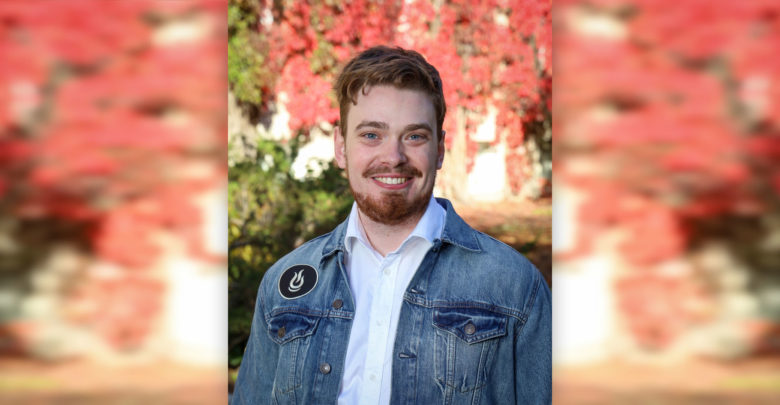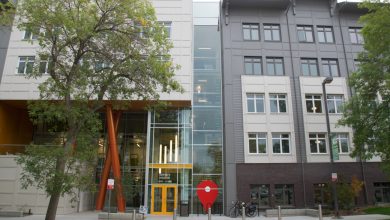 Supplied
SuppliedEach year, The Gateway publishes an evaluation of the Students’ Union Executive and the Board of Governors representative. It’s impossible to discuss every aspect of their tenures, so these reports are largely based on the major components of the platform each executive campaigned on, and the most significant responsibilities of their respective positions.
And if you’re short for time, check out our TLDR for a bite-sized breakdown.
Rowan Ley: B+
The Students’ Union president is the face and figurehead of the Students’ Union. This involves plenty of media interviews about advocacy work, sitting on university governing bodies such as General Faculties Council (GFC) and the Board of Governors (BoG), and leading the Students’ Union executive team.
This has been an unconventional year for universities. Amidst rising case numbers and switches from online to in-person classes, students needed strong advocacy this year more than ever — and Rowan Ley, as Students’ Union president, delivered.
Pivoting during a pandemic, and long term impacts
In our interview, Ley said that one of the things he was most proud of achieving as president was navigating the chaos of the pandemic.
“We had pretty substantial advocacy wins on campus masking policies and on-campus vaccination policies back in August. The university and the government wanted us to come back with no masks, no vaccine requirement — in hindsight, that sounds crazy,” he said.
While I don’t think sole credit for these wins can be placed on our Students’ Union as this was a province-wide fight, Ley was certainly a strong voice and an excellent communicator during this time. He consistently took student safety seriously and responded to concerns.
These wins, however, are likely one-offs for this year; when I asked Ley what lasting impacts he thought he had made as president for the students of tomorrow, his answer was exploration credits. Exploration credits is a fancy term for what is essentially a permanent credit/no credit scheme that would allow students to have more flexibility in their degree. With this program, if a student is doing bad in a course they would have the choice to take a credit/no credit grade as opposed to a letter grade for a set number of courses. This is already a successful program at many North American universities, like the University of British Columbia for example.
“That’ll help with their mental health, it will help them explore new and interesting options and what I’m especially proud of is that this will actually be one of the best, most progressive optional credit/no credit policies in Canada,” Ley said.
That is a big claim, and there’s no way to tell how true that is until the proposal is presented publicly, but if this does successfully go through, it will hands down be Ley’s legacy on the Students’ Union and probably their biggest substantial win for students in years. The proposal goes to vote this March and Ley said he was very confident it will go through; “Barring some insane act of God, this will be in the academic calendar starting next September.”
Ley’s B+ is contingent on this proposal going through — if does not, his grade would have been lower.
Delaying exceptional tuition increases was another win for Ley, as the proposal has still not been approved by the minister of advanced education. While Ley’s advocacy on GFC and the BoG did not keep these governing bodies from voting in favour of the proposal, his complaints about a lack of consultation did contribute to the proposal getting rejected the first time around. This delay means one less year students will be paying exceptionally higher tuition.
Childcare and protests take a backseat
The president oversees and collaborates on a lot of the advocacy that is undertaken by the other executive roles; many of their goals were also Ley’s goals.
His work with Talia Dixon saw the creation of the family lounge, a space on campus for students with dependents. This is certainly a great accomplishment for both of them but part of these plans also included creating better child-care spaces for these students, with the goal of opening a new centre in three years. From the sounds of it, these plans are behind schedule; “the timelines on some of what we wanted to do have just been stretched out,” Ley said.
He says they are working on a “blueprint” to outline a business case for the next executive to continue working towards this goal. This is a fairly ambitious long-term project so this comes as no surprise, but I would have liked hear more tangible progress on this front.
Ley was a strong voice in standing up to the government and the university this year, however, I would have liked to see more. The Students’ Union should have organized more protests this year; our university has seen such blatant attacks in the past few years while our SU has done very little to fight back. The times justify more radical action and our Student’ Union should be protesting more and, in my opinion, considering things like tuition strikes.
While the virtual walkout of GFC and petition speaking out against sexual violence on campus was great, an in-person protest would have been better. And while there was also a protest speaking out against the provincial budget cuts last week, something earlier in the year — when the final numbers for the budget were being determined — would have been better than a demonstration right before the budget gets released.
This would have been a great year to change the Students’ Union’s bad habit of avoiding organizing their own protests. In our third year of unprecedented budget cuts in this province — which are disproportionately hitting our university — we need to be doing more to protest the provincial government’s attacks on post-secondary.
TLDR: Ley has been a stronger president than students have seen in a few years. He has done his role well and if exploration credits go through, he has left a huge lasting impact for students. Ley has achieved most of what he set out to do; he wrote a platform that was realistic, and was able to gracefully pivot his advocacy in a year that saw many disruptions brought in by the pandemic. That being said, in these exceptional times, we need an exceptional response, and I would have liked to see more radical action taken in the form of protests from our Students’ Union.
A-range: This person has fulfilled the promises they campaigned on and more, has created tangible change during their tenure, and has shown a commitment to improving the lives of students. Their GPA is top tier.
B-range: This person has done their job consistently well, but has not made any remarkable changes, or has fallen short on important goals they set out in their platforms. They’re doing fine, but it’s nothing to phone home about.
C-range: This person has done their job sufficiently, but has failed to make significant progress in the areas most relevant to their portfolio, or has essentially abandoned a major part of their platform. They’re still passing with a safe buffer though, and Cs get degrees!
D-range: This person has done a very lacklustre job, and has not sufficiently fulfilled their campaign promises or the responsibilities of their position.
F-range: This person has not done their job, has not represented students, and has not fulfilled their campaign promises whatsoever.




